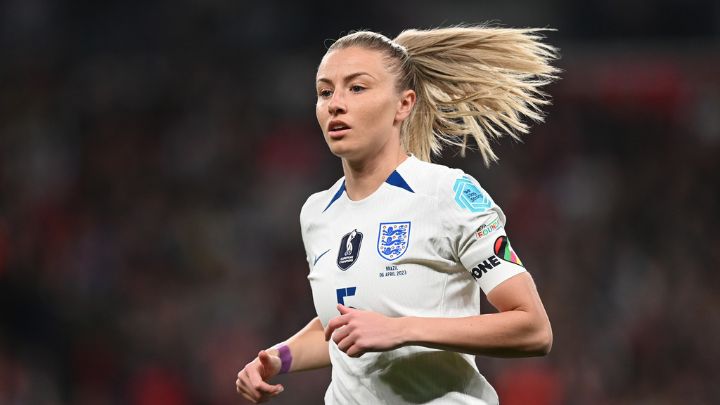When we think of footballers, images of stadiums filled with roaring fans, last-minute goals, and dazzling footwork come to mind. On the other hand, the world of finance may encourage thoughts of complex spreadsheets and strategic investments. While both career paths appear worlds apart, there are some stories where they intersect in surprising ways.
You may be familiar with some of the following names from on the pitch, yet they also have a background in finance. Whether they traded their football boots for business suits, or are studying during or after their footballing career, these dual-career paths offer unique insight into the blend of physical agility and mental fitness.
Footballers in finance
Leah Williamson
English footballer, Leah Williamson, is well-known for being part of the England women’s national team and Arsenal Women. However, her skills do not just lie on the pitch.
Alongside her football career, Leah Williamson has also been training to be an accountant as an ‘insurance policy’ in case football didn’t work out. Not only does this further showcase her hard work and determination to succeed, but having strong financial literacy knowledge can also be beneficial for managing her finances and planning a life after football.

Leah Williamson, credit: UEFA Women’s EURO
Sam Cosgrove
Another English footballer, who is currently playing for Barnsley, is Sam Cosgrove. Back in 2019, it was reported that Sam Cosgrove was studying towards his AAT qualification. Similarly to Leah Williamson, he made the decision to seek other career options in case things didn’t go to plan.
Speaking to AAT, Cosgrove opened up about his studies, stating that “it’s a great stepping stone, it opens up a lot of avenues whether in accountancy itself or elsewhere.”
Not only does this help him in the future should he need it, but Cosgrove also took this opportunity to promote the importance of education for young people, intending to encourage them to pursue their aspirations.

<
Sam Cosgrove, credit: Barnsley Football Club News and Now
Reece Stych
Reece Styche is another athlete with a notable link to the accounting and finance industry. The semi-professional footballer began studying for his AAT qualification back in 2014, which has since led to a role as an accounts assistant, allowing him to balance football with a stable job in the finance sector.
N’Golo Kante
Former Chelsea FC player, N’Golo Kante, is also widely known for playing for the French national football team, and yet he has also benefited from further education in the accounting and finance sector. Before his professional football career took off, Kante studied accounting. Like other footballers, this was a backup plan due to the uncertainties of succeeding in football.
While footballers are known to retire in their 30s, it’s fair to suggest that, judging by Kante’s incredibly successful football career, it is unlikely that he’ll still need additional qualifications as a backup. However, speaking to the French Football Federation, Kante did state that he would have logically continued his studies and become an accountant if football didn’t work out.

N’Golo Kanté, credit: ESPN UK
Rebecca Fay
Another footballer who has seen the benefits of holding accounting and finance knowledge is Rebecca Fay. Fay is a footballer for Cambridge City Ladies, but has been dedicated to her studies where she began with AAT and moved on to the ACCA qualification.
Back in 2020, Fay spoke to PQ magazine about her studies: “Having my accountancy career is something I can work in alongside my football, and it will still be there when I retire from playing.” Her commitment to managing both her careers led her to earn the title of AAT Apprentice of the Year in 2017.
Thomas Cruise
Retired footballer, Thomas Cruise, played for clubs such as Arsenal and Torquay United and pursued his career in accounting and finance after football. Similar to many athletes who retire early, he transitioned to a different profession from sports.
Football and finance: skills
Football may seem worlds apart from the accounting and finance industry, and yet there are surprising links between the two careers - particularly regarding transferable skills.
Leadership and teamwork
Success on the pitch requires teamwork, effective communication, and an understanding of each teammate’s role. It’s common to see captains and senior players take on leadership positions - which requires them to have an open mind, clear communication, and confidence in their decision-making abilities so that their peers can trust them.
Collaboration is essential in the finance industry. Accountants and finance professionals must also hold leadership skills, which is often seen in senior and management roles. However, all finance professionals will likely need to showcase accountability and solid decision-making skills within their job roles to successfully provide financial insight for their clients.
Discipline and work ethic
With strict diets, training schedules and consistent practice, a football career isn’t all glitz and glam. It requires significant discipline and a strong work ethic.
Similarly, working in finance doesn’t necessarily mean fancy suits and outward success like you may see in the movies. Finance professionals benefit from having meticulous attention to detail, and they may be required to work longer hours - especially when balancing their work and studies earlier in their careers.
Analytical and strategic thinking
When playing any sport, it’s important to develop tactics, and plans and anticipate your opponents’ next moves. It’s also important to be adaptable throughout the match.
Finance is not too different. Professionals must hold strategic thinking and analytical skills to interpret data, assess risks, and implement strategies for both short-term and long-term growth. The financial landscape is always evolving, especially with emerging technologies. This means that it’s increasingly important to keep up to date with the latest trends and regulations - requiring professionals to be adaptable and future-facing.
Goal setting
Footballers wouldn’t be footballers if they didn’t want their team to score goals. But this doesn’t just have to be on the pitch. Players may set personal goals for themselves and their careers, as well as the overall team goals, and will work diligently to achieve them.
In the accounting and finance industry, financial targets and investment goals are set, as well as professionals’ personal career and workplace goals. There are many opportunities to reach or exceed performance benchmarks set throughout a career in this field.
Final thoughts
The worlds of football and finance aren’t too different, and those who harness the aforementioned transferable skills can transition smoothly between the two. Balancing both your physical and mental fitness through playing football and a career in finance can be extremely beneficial for your well-being - especially while studying.
Browse our accountancy and tax courses and become a confident leader both on and off the football pitch, or read more about the benefits of football when studying.